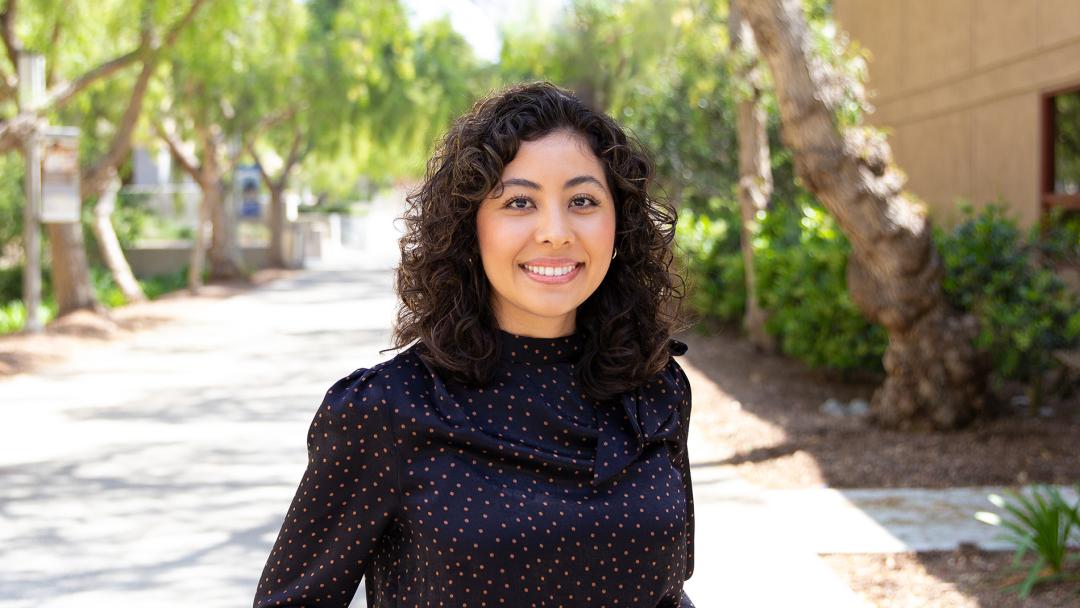
Claudia Valencia-Uribe awarded UC-HSI fellowship
Claudia Valencia-Uribe recalls family drives through California’s farm communities, spotting workers picking fruits and worrying about their survival during droughts.
“Seeing farmworkers out in the fields, their livelihoods being so dependent on water but also facing disparities in water accessibility and quality,” she says, was one reason she decided to study issues of environmental justice.
The doctoral candidate in urban and environmental planning and policy is focused on understanding drought “problem frames” and how they inform water governance.
“Problem frames are essentially how people use their various experiences, values, and backgrounds to make sense of an issue and then use all this information to set the direction for ways to address the problem,” Valencia-Uribe explains.
Her exceptional dissertation research helped her land a University of California-Hispanic Serving Institutions Doctoral Diversity Initiative (UC-HSI DDI) President’s Pre-Professoriate Fellowship. The honor comes with a $37,000 stipend for the 2024-25 academic year and a $10,000 grant reserved for professional development opportunities.
“I’m really excited, happy, and proud to receive this fellowship,” says Valencia-Uribe, who has a B.A. in political science and B.S. in economics from Cal Poly Pomona (2014) and an MPP from UC Irvine (2016), and plans to complete her doctorate in June 2025.
Meanwhile, she is studying nonprofit organizations throughout California.
“I have been conducting interviews with nonprofit practitioners across the state to learn how their regions and communities experience extended periods of water scarcity,” she notes. “The goal is to better understand this complex and multifaceted issue, to learn how these organizations communicate their frames to decision makers, and to learn how receptive and inclusive decision-making processes are to varying perspectives.”
Her research interests are informed by her personal experiences and observations, as well as her involvement in water justice advocacy. She worked for a Native American tribe before enrolling in UCI’s doctoral program.
“I had the chance to be involved in the tribe’s efforts to stop the construction of a hydroelectric plant that threatened the health of a local lake, and whose transmission lines increased wildfire risk on surrounding communities and the tribe’s ancestral territory,” Valencia-Uribe says. “I attended several hearings around this plant and observed the efforts the tribe made to be involved in discussions around this project. Fortunately, the tribe had the resources to engage in these conversations, but not every group faces the same circumstances.”
Valencia-Uribe, who plans to pursue a career in academia, served as a graduate student researcher for UCI projects that worked closely with stakeholders to understand certain environmental issues and to identify policies to address them. One of the projects researched flood risk perception among decision makers in Los Angeles.
“That project cemented my interest in problem frames,” Valencia-Uribe says, adding that another project she worked on sought to understand the implications of climate change on the undocumented community in the state, and her passion became clear.
“I have very much enjoyed being part of programs aiming to promote equity and inclusion,” she says. “There is still a lot of work to be done in this area, but my participation in these programs have allowed me to meet students with backgrounds similar to mine. I love learning about their work and motivations behind their research interests. It’s also nice to say that I’m friends with someone in a school across the country studying amazing things. I have made great connections and friendships because of these programs.”
Among her favorite UCI classes is “Research Design,” offered by the Urban Planning and Public Policy Department. “This class allowed me to get a head start on my dissertation proposal,” she says. “It provided the space to really develop my ideas and receive feedback from my peers and Dr. Walter Nicholls. I’ve taken classes with some incredible scholars and my advisor, Dr. Nícola Ulibarrí, is just amazing.”
Ulibarrí returns the praise, calling Valencia-Uribe a fantastic researcher and person.
“I'm delighted to see her hard work recognized by this fellowship,” Ulibarrí says. “California as a whole is also going to benefit from the extra time afforded to Claudia’s dissertation. Nonprofit organizations often serve as a frontline for vulnerable communities, providing access to resources and advocating for their needs in broader policy processes. As drought is causing numerous disruptions across California — from wells running dry to economies shifting away from agriculture to health impacts from wildfires — understanding how nonprofits are engaging with the problem of drought will yield critical insight into understanding how the state can manage water in a more sustainable and equitable way.”
— Mimi Ko Cruz